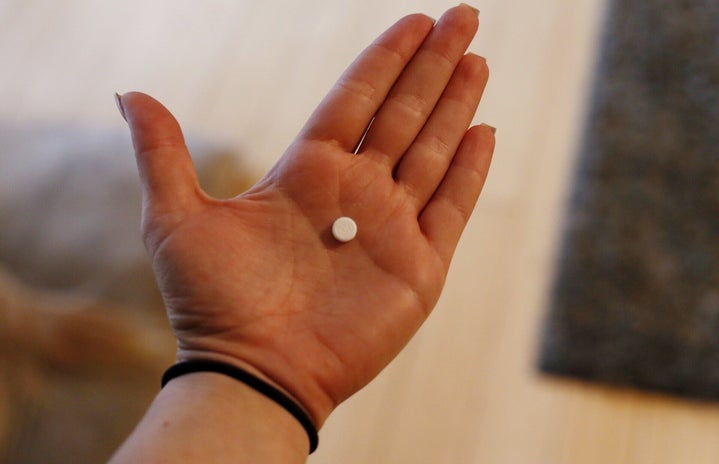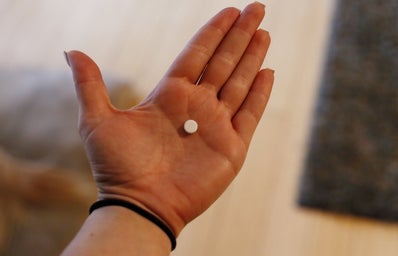Almost anyone who has a menstrual cycle has either taken or considered taking birth control. This can be for a multitude of reasons, like avoiding pregnancy, to help with acne, to help alleviate menstrual symptoms, or to help with PCOS symptoms. Hormonal birth control is very readily prescribed to people who menstruate, and yet so few of the negative aspects of it are fully disclosed to the people using it.
Hormonal birth control comes in many forms, such as the pill – of which there are many types, the patch and the implant, among others. These all use the hormones progestin and oestrogen, either separately or in combination with one another to avoid pregnancy. The general idea is that these hormones are used to stop the release of other hormones that that would bring about ovulation. On top of this, progestin and oestrogen tend to thicken the cervical mucus, making it hard for sperm to make it through the mucus to the egg. The hormones also prevent the uterine line from thickening, meaning that in the rare case that an egg is developed, it won’t be able to stick to the uterine lining because of how thin it is. Of course, some of these contraceptives work a little differently, but this is generally how most of them work.
The choice of what kind of contraceptive usually depends on the person taking them, as well as reactions to or experiences of contraceptives. Some contraception takes more effort than others – for example, you have to take the pill at the same time every day, versus getting an implant that lasts for about 3 years. Some also tend to be more painful or daunting to take, like taking a pill as opposed to inserting an implant, which will influence your choice of contraceptive. It’s also important to note that the methods all have varying levels of success in preventing pregnancy, which you may want to consider if using contraceptives specifically for pregnancy prevention.
An interesting thing that not many people seem to know about hormonal birth control is that the ‘period’ you get whilst taking the contraceptive isn’t actually your period. No ovulation means that there’s no egg and uterine lining to shed – remember, birth control causes this to get thinner rather than thicker – meaning there’s nothing for your uterus to get rid of. The ‘period’ is instead caused by the withdrawal of hormones for a period of time, such as the ‘sugar pills’ on the oral contraceptive. This is also why it isn’t uncommon to not have your period when you are on contraceptives, as sometimes the uterine lining is too thin to shed.
Though contraceptives tend to have a nice ring to them with the whole ‘no pregnancy’ thing, there are some pretty difficult side effects that could really change your opinion on using them. Remember that hormonal contraceptives work by putting more hormones into your body, so your body needs time to adjust, but it also means there will be changes that will remain present throughout usage of the birth control because of the increased hormonal level. The side effects tend to be really downplayed by medical professionals, and are often skimmed over instead of discussed at length. These side effects include depression, weight gain, hair growth/loss, nausea, headaches, menstrual cycle changes, mood changes, and a decreased sex drive, among many others. Medical professionals do believe that the side-effects either decrease throughout usage or will reverse once you stop taking the pill. Nonetheless, these side-effects are very real, and can make the experience of birth control a very difficult one.
For the first couple weeks of being on a contraceptive, experiencing nausea and headaches is pretty common as your body is adjusting to the hormones. It is an unpleasant experience but does tend to go away as you get used to being on the contraceptive. If the symptoms do last for a long duration, you may want to speak to your doctor about changing your contraceptive. Remember, there are plenty of options with differing levels of hormones, so it may take some time to figure out which works best for you.
Though many medical professionals state that being on a contraceptive does not cause depression, there appears to be an increased risk of depression for people on contraceptives, meaning there is some link between hormonal birth control and depression. Contraceptives do tend to result in mood changes because they’re hormone based, which can make the first couple months of being on the contraceptive very difficult. Interestingly, there seems to be an argument that it is only the combined form of birth control – one that contains the use of both oestrogen and progestin – that is linked to depression. Naturally, the relationship between hormonal birth control and depression is severely under researched – thank you, misogyny – so there aren’t any real answers to how the link between birth control and depression comes about. It is important to be aware of this possible increased risk of depression though as it may be overlooked by doctors, and may heavily influence your decision to be on birth control as well as the attention you pay to how you’re feeling.
Hormonal birth control is also associated with causing weight gain. Some medical professionals deny this, arguing that it is water retention changes for the first three months, or rather that it is the increased oestrogen levels that cause fluctuations in appetite. However, if the increased oestrogen level is caused by the birth control, then it logically makes sense to link the two. It is interesting though, as some medical professionals will ensure that people with PCOS take a contraceptive that is least linked with weight gain. So, though professionals don’t actively state that it causes weight gain, there is a link that you may want to consider if you’re someone who is easily bothered by weight gain or body changes – though you shouldn’t be because your body is meant to change and grow as time goes by, so let’s just remember that there’s absolutely nothing wrong with gaining weight! Other bodily changes that may occur are hair growth or hair loss, which again, are caused by individual responses to the hormones.
A side effect that isn’t often brought up or widely discussed in the decrease in sex drive caused by the contraceptive. Naturally, if you’re someone who normally has a high sex drive, the drop in desire to have sex may really trouble you and make you feel less like yourself. The decreased libido is linked to the “decreased” level of testosterone cause by the contraceptive – it is not actually decreased, rather the oestrogen and progestin are increased, making it seem like there’s less testosterone. Unfortunately, this isn’t always an easy fix, though it is recommended to make lifestyle changes that could increase your testosterone levels – such as eating foods containing more zinc.
Unfortunately, the side effects of hormonal birth control can make them very difficult to be on. People on birth control often state that they don’t feel like themselves because of the mood changes – which can be pretty severe – the depression, and the low libido. Though it does take some time to adjust to being on hormonal birth control, it’s important that you know that you aren’t meant to feel all these things for a long period of time. Of course, there are options outside of hormonal birth control and condom usage (though condom usage is very highly encouraged) that can prevent pregnancies, such as natural birth control, which works in accordance with your diet and your menstrual cycle, but just take a little more effort than hormonal birth control.
It’s also important to note that coming off hormonal birth control, for whatever reason, can be a very difficult and frustrating experience. This is because your body has to adjust to the lack of synthetic hormones its used to getting and has to adjust to being on your natural menstrual cycle. This does mean that you will experience a lot of irregular bleeding and spotting for the first couple months. It is also quite likely that you will feel very emotional, as your body will be readjusting its hormone levels all over again. Your body will also revert to your old menstrual cycle, so if you experienced heavy cramping before going on the contraceptive then the cramping is likely to come back. It’s also very important that you are aware that the risk of pregnancy occurs as soon as you stop the pill!
Ultimately, hormonal birth control can be a bit of a tricky situation to wade through. The side effects very commonly affect the way you feel and can make you feel like a completely different person. Doctors don’t always readily discuss with patients these side effects and the extent to which they may be experienced, which makes the process of experiencing the side effects even more confusing. It’s important to consider whether avoiding pregnancy, clear skin and alleviated menstrual or PCOS symptoms are worth the possible side effects, as well as whether there’s an alternative that may be less of a hassle to your well-being. Remember to put yourself first, always. Don’t be afraid to discuss these options in depth with your doctor, because at the end of the day you will be the one who will experience these side effects.


